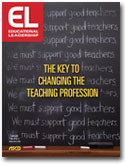The May issue of Educational Leadership covers the many ways the teaching profession is changing and how educators are responding to those changes.
- What are some of the biggest changes you've seen during your teaching career? How have these changes affected your attitude toward your work and your ability to be an effective educator?
- What are some changes you would like to see? What steps might you and your colleagues take to make those changes happen?
- How do you think the profession will change in the coming years? In "The Teachers of 2030," Renee Moore and Barnett Berry share the thoughts of the TeacherSolutions 2030 team. What do you think of these predictions? Do they seem accurate? Way off base? How might you and your colleagues prepare for whatever changes you anticipate?
Learning in a New World
In Professional Learning 2.0, Catherine Huber discusses how blogs, wikis, Twitter, Moodles, and other online tools have transformed professional learning. Photocopied articles with routing slips attached, which are soon relegated to a busy teacher's in box, are no longer the only—or the best—way to share relevant information. Technology now enables educators to select the information sources that best meet their needs, make their own comments on that information, and interact with colleagues virtually.
- How has technology changed your professional learning? Have you used any online tools for professional development? Which ones have been most and least useful?
- If you're experienced with using technology for professional growth, what advice would you share with colleagues looking to get started?
- What benefits and drawbacks do you see in taking professional development online? What will professionals gain from virtual learning opportunities, and what might they lose?
- Commit, as individuals or as a group, to trying out one online learning tool for a month.
- If you've primarily been a "lurker" (one who reads and follows online conversations but doesn't participate), try stepping out of your comfort zone and speaking up. Make a comment on a thought-provoking blog post or article, ask a question in an online forum, or post a link to an article on Twitter.
Making Evaluations Useful
In "No More Valentines," Morgaen L. Donaldson writes that the majority of teachers are rated well above average, and many do not receive detailed feedback on their performance.
- Describe your experiences with teacher evaluation. If you are a teacher, have the evaluations been helpful? Do you believe your evaluators accurately described your performance? What could be done to make evaluations more meaningful?
- What should be the purpose of teacher evaluations? Should their primary goal be to guide teachers to improve? To determine salaries and bonuses? How can evaluations in your school or district better achieve their goals?
- Donaldson explains how three school districts have revamped their evaluation systems. Another example appears in the online-only May article, "How North Carolina Improved Teacher Evaluation." Which aspects of these systems seem to have the most potential for your district?
A New Generation of Teachers
Two articles in the May issue ("Realizing the Promise of Generation Y" and "Holding on to Gen Y") discuss the influx of Generation Y teachers into the profession. These new teachers bring with them a strong comfort level with technology and a commitment to social justice. But some studies have shown that they may not be as committed to staying in the profession for the long term, especially if teaching does not live up to their expectations.
- What differences have you observed between older teachers and the young teachers beginning to enter the profession? What similarities do they share?
- If you're a member of Generation Y, what brought you into teaching? What are your plans and hopes for your career? Do the descriptions in the two May articles ring true for you? Explain.
- What can schools do to meet the needs of Gen Y teachers, thus keeping them in the profession and encouraging professional growth? How might these initiatives also benefit older, more experienced teachers?





